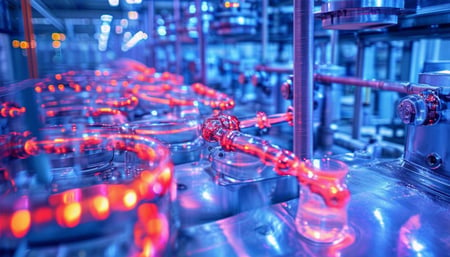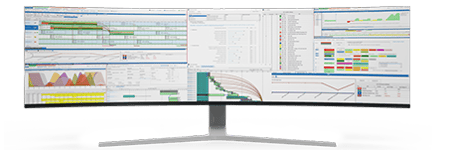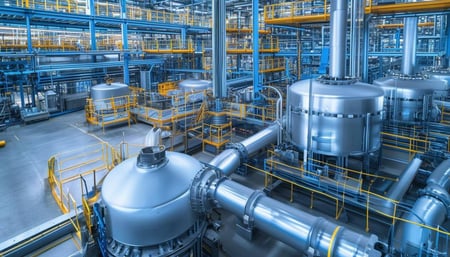Elevating Flow Production Planning in Chemical Manufacturing
Production planners face unique challenges that demand agility, precision, and a deep understanding of the processes that drive production efficiency. Flow production planning, a critical component of lean manufacturing, focuses on minimizing bottlenecks, optimizing throughput, and reducing lead times across production lines. When integrated with robust software solutions like PlanetTogether and ERP systems such as SAP or Oracle, flow production planning becomes not only manageable but also strategically advantageous. This blog explores how integrating PlanetTogether with leading ERP systems can elevate flow production planning, addressing common industry challenges and delivering sustainable improvements to your production operations.

Flow Production Planning in Chemical Manufacturing
Flow production planning is the process of ensuring that production flows smoothly, without interruptions or delays. In the chemical industry, where production involves complex chemical reactions, stringent quality standards, and specific timelines, flow production planning becomes essential. Delays can lead to spoilage, increased waste, and ultimately higher production costs, while poor planning could lead to quality compromises that affect both compliance and customer satisfaction.
Implementing effective flow production planning requires a detailed understanding of both the raw material inputs and the production processes. It involves:
Balancing Production Line: Ensuring that each step in the process has the resources and capacity needed to maintain steady flow without creating bottlenecks.
Reducing Work-in-Process (WIP): Minimizing the number of items in production to avoid congestion, reduce storage costs, and improve visibility.
Optimizing Throughput Time: Reducing the total time it takes for products to go from raw materials to finished goods, improving overall efficiency.
Given the complexity and scale of chemical manufacturing, manual approaches to flow production planning are neither efficient nor sustainable. Digital solutions like PlanetTogether, when integrated with ERP platforms like SAP or Oracle, offer a path to more strategic, data-driven flow production planning.
![]()

The Power of Integrating PlanetTogether with SAP/Oracle for Flow Production
The integration of PlanetTogether with SAP or Oracle brings real-time visibility, advanced analytics, and predictive planning capabilities that are essential for optimizing flow production planning. By aligning your production planning software with your ERP system, you can streamline data sharing, reduce errors, and enable a seamless flow of information across departments. Here’s how this integration can enhance flow production planning in chemical manufacturing:
Unified Data for Informed Decisions Integrating PlanetTogether with SAP or Oracle centralizes production data, financial data, and supply chain information into one comprehensive platform. With access to unified data, production planners can make better-informed decisions, analyzing trends and identifying potential issues before they become costly problems.
Enhanced Scheduling and Real-Time Adjustments In chemical manufacturing, unexpected changes—whether they involve equipment maintenance, raw material shortages, or demand fluctuations—are inevitable. PlanetTogether’s advanced scheduling algorithms, integrated with ERP data, allow planners to adjust production schedules in real-time. This means that when a disruption occurs, the system can quickly identify alternative workflows or resource allocations to maintain flow, minimizing downtime and keeping production on track.
Inventory and Resource Optimization Inventory levels and resource availability are crucial in maintaining steady production flow. PlanetTogether’s integration with SAP or Oracle provides real-time visibility into inventory and resource usage, allowing planners to make data-driven adjustments. For example, if a particular raw material is running low, the system can trigger alerts, enabling the team to procure more before it impacts production flow.
Accurate Forecasting with Predictive Analytics Chemical manufacturing relies on demand forecasts to ensure that production volumes match market needs. With predictive analytics powered by PlanetTogether and ERP data, production planners can access more accurate forecasts, reducing the risk of overproduction or stockouts. This predictive capability enables better alignment between production planning and market demand, helping maintain a smooth flow of products through the production line.
Seamless Quality Control Quality is a critical concern in chemical manufacturing, as deviations in production parameters can lead to costly recalls or compliance issues. PlanetTogether’s integration with ERP systems supports quality control by monitoring parameters and generating alerts when data suggests deviations. Planners can quickly identify and address quality issues before they disrupt the flow, ensuring that products meet regulatory and customer standards.

Key Benefits of Flow Production Planning Integration
The benefits of integrating PlanetTogether with ERP systems like SAP or Oracle go beyond operational efficiency. For production planners, this integration facilitates:
Improved Decision-Making Through Data Visibility A centralized platform enables a holistic view of the production line, offering data that spans from raw materials to end products. This visibility helps planners make quick, informed decisions and fosters collaboration between departments, improving overall operational efficiency.
Proactive Problem-Solving Flow production planning often requires addressing problems before they impact the production line. With real-time data and predictive analytics, planners can identify potential bottlenecks, resource shortages, or quality issues early and proactively address them to avoid disruptions.
Reduced Production Costs By optimizing flow, reducing WIP, and minimizing bottlenecks, companies can significantly reduce their operational costs. The integration allows production planners to identify cost-saving opportunities, such as reducing waste or avoiding excess inventory, which contributes directly to improved profitability.
Enhanced Compliance and Quality Assurance Compliance is a cornerstone of chemical manufacturing. Integrated solutions that offer real-time quality monitoring and tracking ensure that every batch meets regulatory standards. Additionally, automated alerts for out-of-spec production help in reducing risks and improving quality assurance across the production process.
Greater Agility and Responsiveness to Market Demands In today’s competitive landscape, agility is critical. Integration enables rapid adaptation to market changes, ensuring that production volumes and schedules align with demand. This agility helps companies respond quickly to shifts in market demand without compromising production flow, ensuring a steady supply of products to customers.

Best Practices for Successful Integration and Flow Production Planning
To maximize the benefits of PlanetTogether and ERP integration in your flow production planning efforts, consider these best practices:
Focus on Data Quality and Consistency: Ensure that all relevant data is consistently updated and accurate. Inaccurate or outdated data can lead to ineffective planning decisions.
Train Teams for Collaborative Decision-Making: Empower cross-functional teams to leverage the integrated system, ensuring that production, quality, and supply chain teams are aligned in their approach to maintaining flow.
Regularly Review and Adjust Parameters: As market conditions and internal processes evolve, regularly review and adjust planning parameters, such as lead times and inventory levels, to keep production flow optimized.
Leverage Predictive Analytics for Continuous Improvement: Use the predictive insights generated by the integration to identify trends and opportunities for continuous improvement in your production planning processes.
Flow production planning is a game-changer for chemical manufacturing, and integrating PlanetTogether with ERP systems like SAP or Oracle provides a powerful toolkit for optimizing this process. With the combined capabilities of advanced scheduling, real-time visibility, and predictive analytics, production planners can transform complex, multi-step processes into a streamlined, efficient operation.
By reducing bottlenecks, improving throughput, and ensuring a steady flow of products, this integration delivers tangible benefits that go beyond cost savings, driving value across the entire production line and positioning chemical manufacturers for sustainable success.
Production planners who embrace this integration are not only improving day-to-day operations but are also setting a solid foundation for growth, adaptability, and long-term competitiveness in a demanding industry.
In a market that demands both precision and agility, the combination of PlanetTogether and ERP integration represents a strategic asset for chemical manufacturing facilities ready to excel in flow production planning.
Are you ready to take your manufacturing operations to the next level? Contact us today to learn more about how PlanetTogether can help you achieve your goals and drive success in your industry.
Topics: PlanetTogether Software, Integrating PlanetTogether, Seamless Quality Control, Chemical Manufacturing, Enables Proactive Problem-Solving, Unified Data for Informed Decisions, Inventory and Resource Optimization, Accurate Forecasting with Predictive Analytics, Enhanced Scheduling and Real-Time Adjustments




















LEAVE A COMMENT